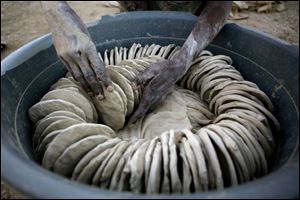
Mud cookies at luxurious resort would be just desserts for rich
2/11/2008Punta Cana, Dominican Republic - Melia Caribe Tropical is a secluded seaside resort on the eastern tip of this Caribbean Island. At this all-you-can-eat-and-drink resort the only impediment to gluttony is the size and capacity of one's stomach and the endurance of one's liver. I came here with a group of friends and colleagues from Toledo for a week of medical education, fellowship, and simple, plain relaxation in a beautifully appointed accommodation and sun-drenched sandy beaches.
During a recent morning walk on the beach I saw a scene that could have been straight from the pages of Opulence magazine or from the lifestyles of the rich and famous. There was this beautiful and elegant table for two, set on the deserted beach in front of an exclusive small hotel. A young couple, probably on their honeymoon, were enjoying their breakfast while watching a spectacular sunrise. A hotel attendant stood 20 feet away to attend to their whims and their wishes.
The irony of the scene was not lost on me, because earlier I had read a report from Haiti where poverty and starvation are forcing the poor and the destitute to eat mud cookies called terre made from yellow clay, salt, and vegetable oil. While this young couple - and this columnist - were basking in the lap of luxury, barely a few hundred miles to the west on the same island - Hispaniola of yore and now divided between the Dominican Republic and Haiti - people had resorted to eating dirt to stave off hunger. Such a severe scarcity amidst such abundance and indulgence.
Haiti is not, by any stretch of imagination, the only country in the world where people are starving. Poverty and hunger are worldwide phenomena and these numbers attest to that assertion. Each year more than 80 million people die worldwide because they cannot afford to stay alive. More than 1 billion people, 1 in every 6 persons, live on less than $1 a day and a great majority of them go to bed hungry and get up hungry.

Dried mud cookies are arranged for sale in Port-au-Prince, Haiti. They are made from dirt, salt, and vegetable oil.
There are reasons and causes galore for poverty and being lazy or unmotivated are not among them. For an overwhelming majority it is not their choice. Instead they are often the pawns in geopolitical struggles and governmental policies that favor the rich and the affluent.
One way to eliminate poverty and hunger would be to beat our swords into plowshares. The world spends a staggering $1 trillion every year on instruments of war and devastation, of which the United States spends two thirds, or $650 billion. Having all those plowshares would be good as long as the rich and the powerful would stop coveting poor men's natural resources. Add to that the long-standing practice of wars, famine, and geopolitical upheavals, and you have a recipe for poverty, hunger, and human degradation.
The most glaring reason for poverty, however, is the widespread corruption among the leaders, who are responsible for lifting their people out of a seemingly intractable poverty trap. Such misrule is often the rule rather than exception among a vast number of countries in sub-Saharan Africa and many other countries scattered around the world. They include the likes of Papa Doc and Baby Doc, two brutal dictators from Haiti's recent past, who have been responsible for depriving their countries of the wealth that belongs to the people.
Most of these dictators flee the country when they lose their grip on power and live out their remaining life in splendid exile.
The World Bank and the International Monetary Fund work on big scale and speak the language most of us do not understand. Do we, as individuals, have an obligation to help those who are, for no fault of their own, down in the pits? We know that asking our children to clean their overstuffed plates because there are starving children in India or Africa has not made those children less hungry.
Perhaps we could buy fewer groceries and share the savings with those who have nothing. Or skip a few meals in a week.
Just for variety, the opulent hotel in Punta Cana could still serve the elegant breakfast on the beach but perhaps add a few mud cookies.
Suggested listening with the mud cookies: "Hail To Thee Fat Person," a song by Allan Sherman. (LP My Son The Nut, Warner Brothers, 1963.)